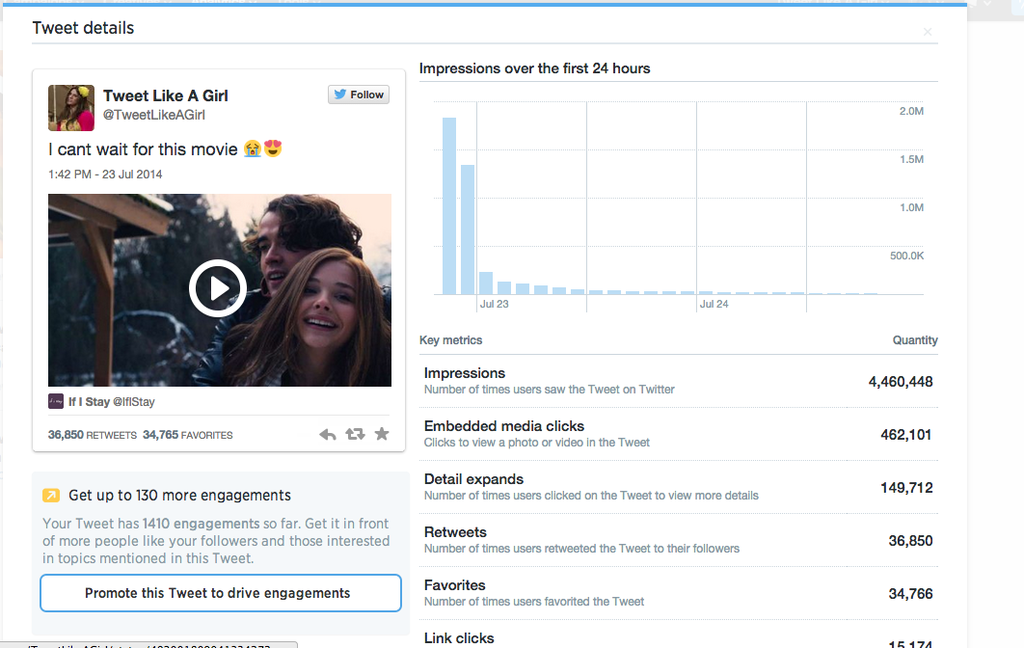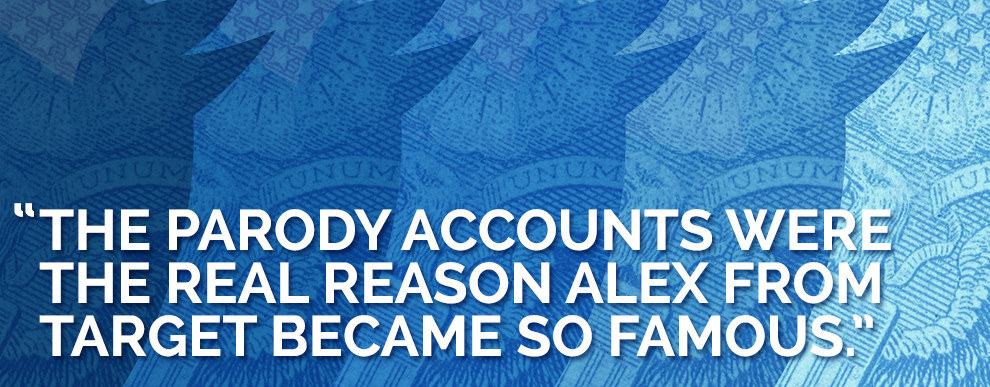
Cameron Asa is a 21-year-old communications major at the University of Tennessee. He's also the owner of Tweet Like A Girl, a Twitter account with 1.2 million followers.
Asa doesn't tweet as frequently as some "parody accounts," but when he does, he wracks up thousands of retweets. On Nov. 4, he tweeted, "stress goin up on a tuesday"; it's been retweeted 12,000 times. On Nov. 1, he tweeted, "No shave November aka guys with scruff aka what a time to be alive"; it's been retweeted 6,000 times.
He told BuzzFeed News that he's part of an unofficial network of Twitter users, all with massive parody accounts who are regularly responsible for making new memes go super viral. He said the network — which has no corporate sponsor backing it — was responsible for the "Alex From Target" sensation on Sunday.
"I know for a fact it was the parody accounts that started it," Asa said. "It was just absolutely nuts. I've never seen anything like it."
But randomly flexing their power to launch random cute boys into superstardom is only the tip of the iceberg for Twitter's unofficial parody account network. The guys running these accounts are also making impressive amounts of money.

Asa said he started messing with novelty Twitter accounts during his senior year of high school. His first big hit was a Carly Rae Jepsen parody account.
"I made a parody account that just made, like, parodies to that song, parody tweets to that song," Asa said. "And I thought, Hey, it'd be kind of cool to have a Twitter account with a lot of followers."
Asa's "Call Me Maybe" account got around 40,000 followers, and it got him thinking about other kinds of things that could do well on Twitter. He tried one he admits was pretty stupid called Retweet Dares that got around 180,000 followers. The tweets would basically dare users to retweet the account.
Asa stumbled upon Tweet Like A Girl in 2012. He said in the beginning the account was meant to make fun of girls.
"Like, for example, one of the tweets would be like, 'Oh my god, I'm so fat,' with a picture of a stick or a twig," he said.
He said he gained 100,000 followers in five days, but Asa hit the wall that all novelty accounts eventually hit: He ran out of material. So he decided it was time to expand Tweet Like A Girl's scope.
"I transitioned into relatable tweets for girls, and ever since I did that, it's still been nuts," he said.

Asa's new game is keeping his account relevant and relatable — and it's working. He's now pulling in pretty massive money. He was a little uncomfortable discussing the amount he makes per retweet, but he said that it can be as high as hundreds of dollars.
"Lately I've been posting for different apps, and it can range from anywhere from $500 - $1,000 per post — it's awesome," Asa said. "I actually did an app tweet last week and I ended up getting the app 20,000 downloads off one tweet."
It makes sense that brands are clamoring to work with parody accounts; the engagement for an account like Tweet Like A Girl is astronomical. Asa said he's hoping to branch out to working with movie studios.
He posted a trailer for the film adaptation of Nicholas Sparks' The Best of Me and said he was able to send it 13 million impressions. He sent BuzzFeed News a screenshot of his Twitter analytics for a similar movie trailer tweet he posted in July boasting 4 million impressions.

The elephant in the room, though, with Asa's account — and large female-oriented parody accounts like his — is that at the end of the day, he's a 21-year-old guy tweeting as a teenage girl.
"People ask me all the time," Asa said. "I know, it's kind of weird. I kind of made the page and I have to run it. I really do enjoy running it."
Asa said that he's met and communicates regularly with the people running about a dozen or so of the largest parody accounts on Twitter. They all communicate with each other over direct message.
He said at the most there are only about four women running relatable parody accounts, noting that Common White Girl — one of the largest female-oriented parody accounts with over 4 million followers — is run by a woman.
A way these accounts keep momentum going is by a retweet-sharing deal organized amongst other large parody pages. A large Twitter account like Tweet Like A Girl will make a three-retweet deal with another large Twitter account, like Dory or Fat Amy. Each account retweets three of the other account's tweets. Usually one of those three retweets is a paid ad.
That system helps these independent accounts drive up advertising rates, which usually have a variable included for clicks. Essentially, by working together, each of these guys can make his own independent Twitter media network go viral.


David Rhodes is a 29-year-old from Toronto, Canada, who has been running a network of parody and novelty Twitter accounts since 2012. His largest account is Sex Facts Of Life, which has 1.8 million followers and is also one of the few relatable novelty accounts on Twitter to be verified. Rhodes' second-largest account is Not Will Ferrell, a Will Ferrell parody account.
Those two are just the largest peaks, however, in his incredibly large Twitter network. Rhodes also runs a Brick Tamland parody account, Sarcastic Wonka, Hilarious Ted, and a handful of picture-based accounts like Wow Pics Of Life and Wow Food Porn.
Rhodes' network is so large, he hired a friend as a independent contractor to help him manage all the content.
Rhodes told BuzzFeed News that someone running parody accounts could easily make six figures a year. He was able to start monetizing his parody Twitter accounts in 2012 and quit his job shortly after; his Twitter network is a full-time gig.
"I've always treated it as a business. It's all about integrity," Rhodes said.
Rhodes said that Asa's tactic of targeting young girls with an account is a great market to try to tap into.
"You see a lot of people running those kinds of accounts, a lot of guys running those girly teen accounts," Rhodes said. "I think part of the reason, in terms of engagement, is females are usually the most engaged."
He said the key across the board for anyone to put together a successful novelty Twitter account, though, is finding content that people can relate to.

From an outsider's perspective, this can seem pretty vague and confusing: a group of twentysomething guys who scour the internet for "content" on places like Facebook, Vine, and Tumblr, and then push to their large Twitter networks to help them support a backchannel advertising system.
David Orr refers to the whole setup as "social influencer" marketing. Orr is a 23-year-old entrepreneur from Effingham, Illinois, and he's been able to pivot on his Twitter following to a position as COO of a company. He starts his new role next month, though would not tell BuzzFeed News what company he's joining, only saying that it was a fairly large one.
His largest account is a Bill Nye-themed parody account called Ya Boy Bill Nye. It tweets things like "rims on the prius" or "shouts out all my kids out there grindin through AP tests like 'this shit a game to me homie' getting high scores and college credit I SEE U."
"I'm definitely in this for the marketing aspect, and at the end of the day, obviously the revenue," Orr told BuzzFeed News. "I'm not a writer. I do not write most of my content. I find it [in] other places."
Obviously, going at content creation with a purely revenue-centric mind-set can be problematic. Orr, Rhodes, Asa, and the parody account owners like them all face a tremendous amount of criticism for plagiarism. Orr said rampant plagiarism on Twitter is Twitter's problem, not the people who use it.
"Unfortunately Twitter limits us. I don't think in 140 characters we can add a source," Orr said. "Should Twitter allow for a place to link for a source, I'm sure everyone would be definitely open to that and do it."

To understand the true scope of what this Twitter illuminati can accomplish, you need to look no further than Nov. 2's "Alex From Target" sensation. On the night of Nov. 4, Dil-Domine Leonares, CEO and founder of a tech startup called Breakr, took credit for Alex LaBeouf's viral explosion.
Leonares claimed it was Breakr's network that rallied people around Alex From Target. Leonares couldn't back any of his claims up, but Asa and his parody account can.
Asa, Orr, and Rhodes all agree that it was the swarming of their networks that really bolstered support for LaBeouf early on.
"The parody accounts were the real reason Alex From Target became so famous. They gave him the initial exposure he needed to kind of get the ball rolling," Orr said.
But it wasn't coordinated in the way you'd think. It wasn't a planned campaign; large parody accounts say fans of the band 5 Seconds of Summer engaged with the original tweet and swarmed it.
Rhodes said what happened with Alex From Target was only unusual in the sense that it exploded beyond Twitter. He said that parody accounts are constantly creating worldwide trending topics, and that he used to sit on Twitter at night and start globally trending hashtags for fun.
As for whether or not parody accounts capable of manipulating all of Twitter are ultimately a good thing for social media, Orr wasn't too certain.
"If I didn't think it could have negative effects, I'd be trading retweets on all of my accounts, but I'm not," Orr said. "I don't know the long-term effects."
For Asa, though, he's just having a tough time wrapping his head around the scope of all of this.
"I've been doing this for a really long time now," Asa said, "but sometimes I'll be in class and get on my page and I'll just look at it and just be like, Wow, this is crazy."
This post has been updated to more clearly reflect Cameron Asa's typical going rate for a sponsored tweet. His going rate is $500–1,000; an earlier version of this article misstated this amount.
